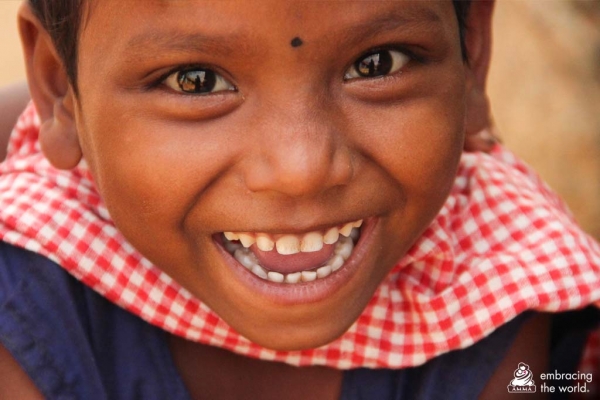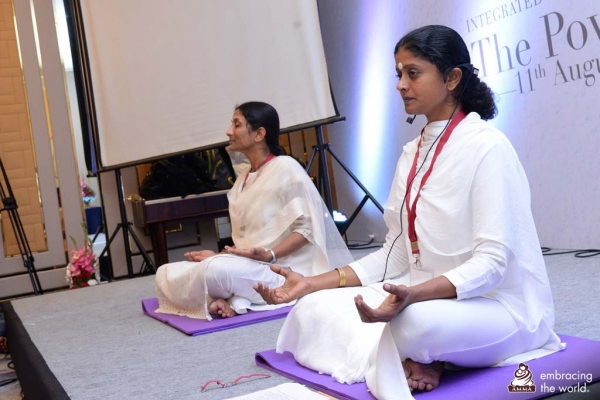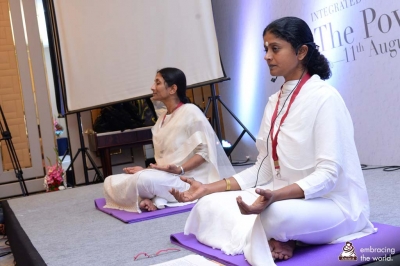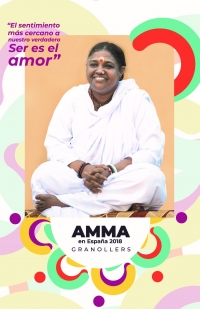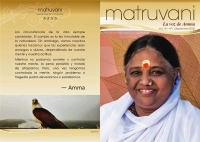Empoderamiento de la población tribal india por medio de la educación
15 de octubre de 2018 - Kollam, India
El Gobierno de la India ha reconocido el importante trabajo de la Universidad Amrita Vishwa Vidyapeetham para formar a la población tribal india en los campos de la educación, la salud y la alfabetización electrónica. El Ministerio de Asuntos Tribales le ha dado a la universidad el título de "Centro de excelencia en empoderamiento tribal a través de la inclusión digital".
El ministerio también destacó el meritorio trabajo que ha llevado en el cumplimiento de los Objetivos de Desarrollo Sostenible de Naciones Unidas a través de las 101 aldeas adoptadas por parte de Amrita SeRVe.
Meditation can bring a positive focus to our world’s leaders
October 23, 2018 - Pune, India
“Meditation is a powerful remedy for these turbulent times,” said Mr. Vijay K. Nambiar, former UN Secretary-General Special Advisor on Myanmar and also Chef de Cabinet under former UN Secretary-General Ban Ki-moon. He encouraged leaders of various institutions to use meditation to succeed in today’s competitive and changing world.
Mr. Nambiar was the keynote speaker at our ‘Power of IAM Leaders Conclave’ that took place in Pune, Maharashtra. The path-breaking event brought together director level executives from government institutions, senior decision makers, opinion formers, business leaders of Indian and multinational companies, as well as top professionals from education, culture, arts, health, sports and media. The focus was to inspire and create a catalyst for the exchange of fresh thinking and partnerships.
La meditación puede ofrecer un enfoque positivo a nuestros líderes mundiales
23 de octubre de 2018 - Pune, India
"La meditación es un remedio poderoso para estos tiempos turbulentos", dijo el Sr. Vijay K. Nambiar, ex Asesor Especial en Myanmar del Secretario General de las Naciones Unidas y también Jefe de Gabinete del ex Secretario General de las Naciones Unidas, Ban Ki-moon. Alentó a los líderes de diversas instituciones a que meditaran para tener éxito en el competitivo y cambiante mundo actual.
As flood waters recede, people return home in Kerala
August 23, 2018 - Kerala, India
“I saw thousands of families, with the same insecure feelings as me, sharing their losses,” explains Sreeni KR. Sreeni works with Amrita SeRVe, our village development project.
“In the camp I have seen the rich and the poor, the goldsmith and the blacksmith, the landowner and the laborer all together. Sharing the same food, shelter and clothes. I have watched the Christian brothers preparing food and serving it to Hindu and Muslim families. This is the beauty of India.”
Sreeni was on a train from Mumbai when the flood waters hit his home in Poolani, Meloor. It’s a small community of 2,500 families, about 75 kilometers north of Kerala’s largest city of Kochi and about 50 kilometers inland from the Arabian Sea.
While Sreeni travelled, he learned flood waters were reaching 15 meters and people were panicking and running to relief camps. But he could not reach his wife, daughter or other family members for many hours. Unimaginable stress.
Sreeni had to stop his travels at the nearest train station in the city of Coimbatore due to flooded roads. He finally got a hold of his family on the phone. They were alright. It took them two days to find shelter in a relief camp, and it took Sreeni another two days to be able to join them.
When Sreeni arrived at the camp of 4,000 displaced people, he was grateful to see members of various political parties, doctors, medical teams, and police all joining together to manage it very well. Most of the evacuees didn’t even have a change of dress. But the camp was able to provide sufficient food, supplies and clothes.
“When I reached the house the next morning and opened the door, the situation was more horrible than I had thought. Almost everything destroyed. The room is filled with silt, mud, tree branches, leaves and many types of snakes,” describes Sreeni.
“We will have to clean many more times before we move back in. All the wells are overflowing with plastic bottles and waste. We have a shortage of drinking water and food supplies. The loss is unbelievable. What my parents earned and saved over the last sixty years was all gone within seconds. But thank God for no human casualty and we are left with four structured walls and a roof.”
Sreeni’s situtation is one that thousands of people across Kerala will deal with over the coming days. As flood waters recede, it is now time to assess overall damages and begin cleanup and restoration.
More than 380 people have been counted in the death toll so far and about 1,100,000 people have been displaced from their homes and sheltered in more than 5,600 relief camps that run in schools, colleges, churches, madrassas and convention halls. The work includes the task of enforcing cleanliness to prevent water-borne illnesses such as typhoid, cholera and hepatitis-A. Buildings, infrastructure and farmlands across the state lay in ruin.
Embracing the World volunteers continue to take part in the efforts. Relief camps in 30 of our 40 Amrita Vidyalayam schools remain in operation, and teams have already begun to disperse into communities to help with initial cleanup. Donations of food, water and essential supplies are being sorted and sent to those in need.
In fact, a tremendous donation of medical supplies arrived with the MA Center in San Ramon, California, US. Volunteers are gathering to sort, count and pack the items for shipment to India.
Despite the fact the flood waters hit the ground floor at Amrita Institute of Medical Sciences and Research (Amrita Hospital), they were cleared within a day and vital treatment remained without interruption. The remote medical units that have been traveling to isolated areas since the outset of the floods also continue their work.
The AYUDH Amritapuri 24-hour emergency call center at Amrita Vishwa Vidyapeetham has received 25,000 calls that led to the rescue and aid of more than 100,000 people. The calls were confirmed by volunteers and then sent to the multi-faceted rescue teams of government officials, Navy, Air Force, Coast Guard, National Disaster Response Force, Army, the police, local fishermen and other volunteering agencies. The center remains in operation. In fact, a team at Amrita Center for Wireless Networks & Applications developed a specialized app to manage the distress calls.
“I can speak for all of the volunteers when I say that we are ecstatic to be able to help in this small way,” said AYUDH Coordinator Amritesh. “We got a lot of positive feedback from the Indian Air Force and Navy, telling us that the information collected through the Amrita Helpline has helped them to better target their rescue and relief operations and to follow through with greater speed.”
As flood evaluation evolves, restructuring teams for overall community rebuilding now prepare for the long journey ahead.
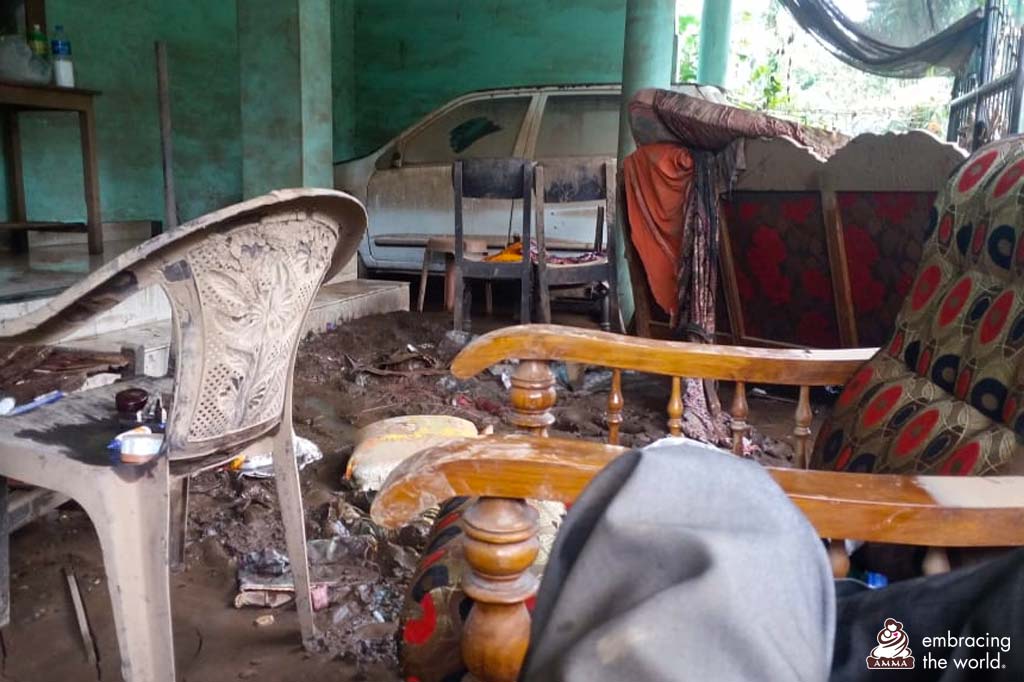
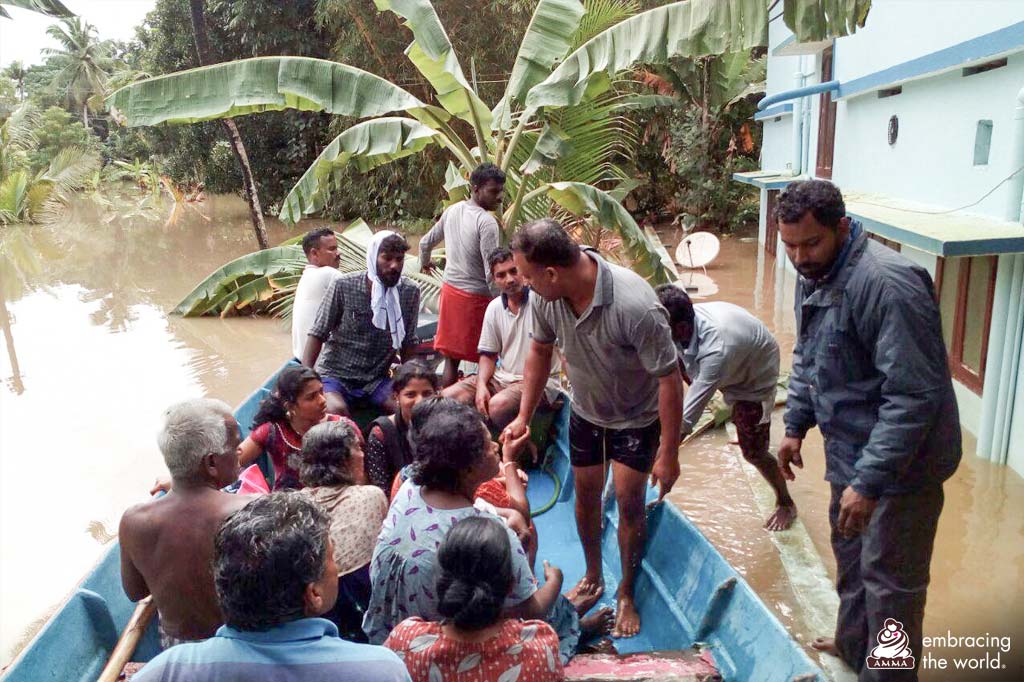
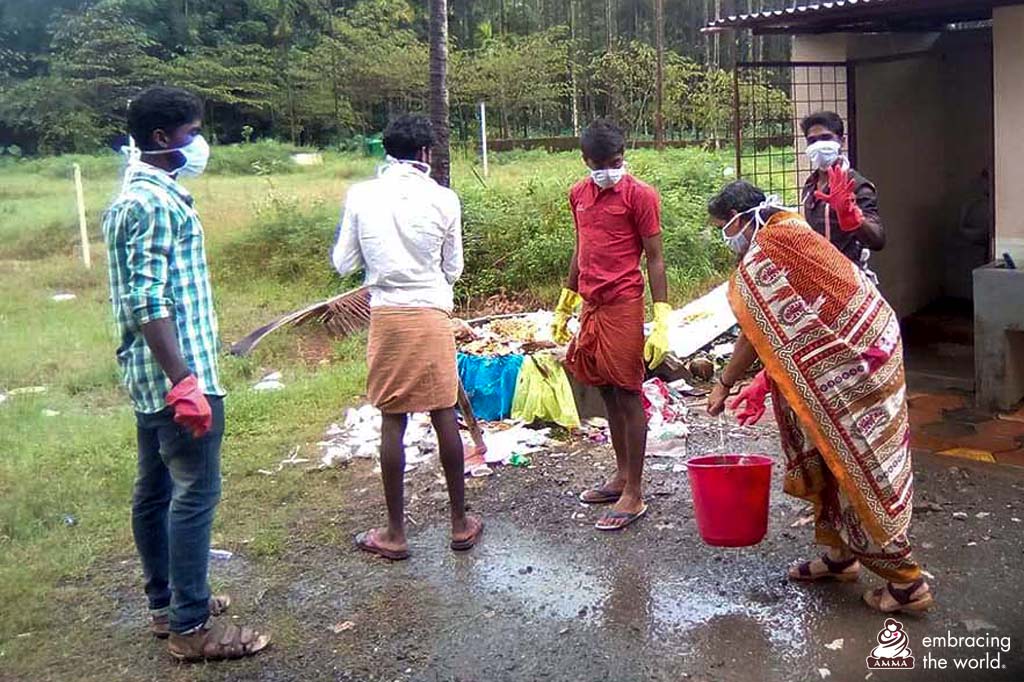
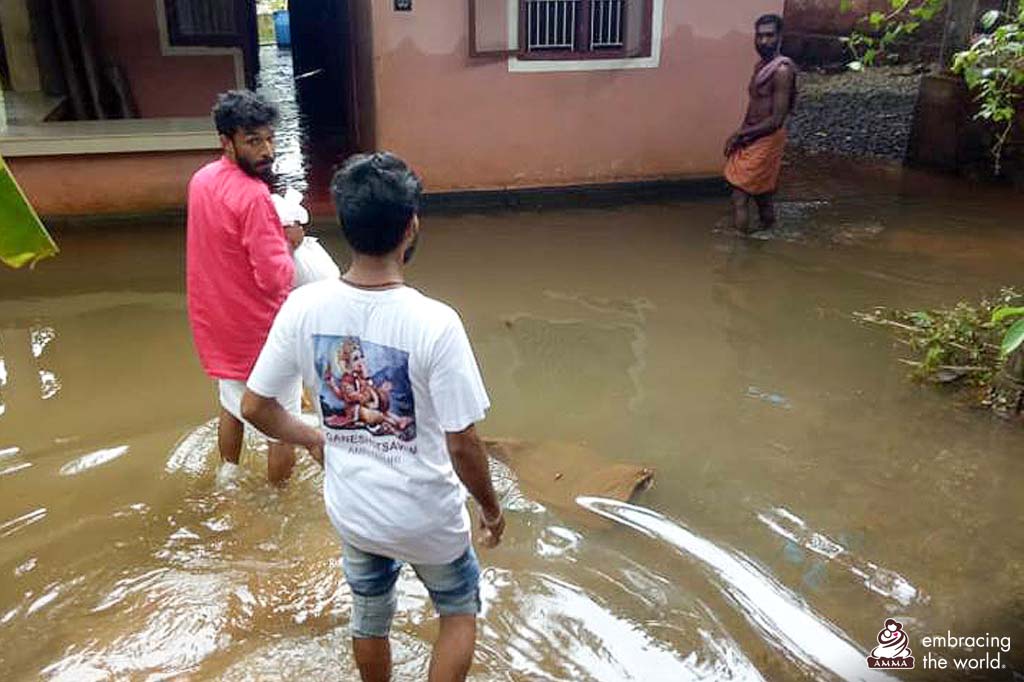
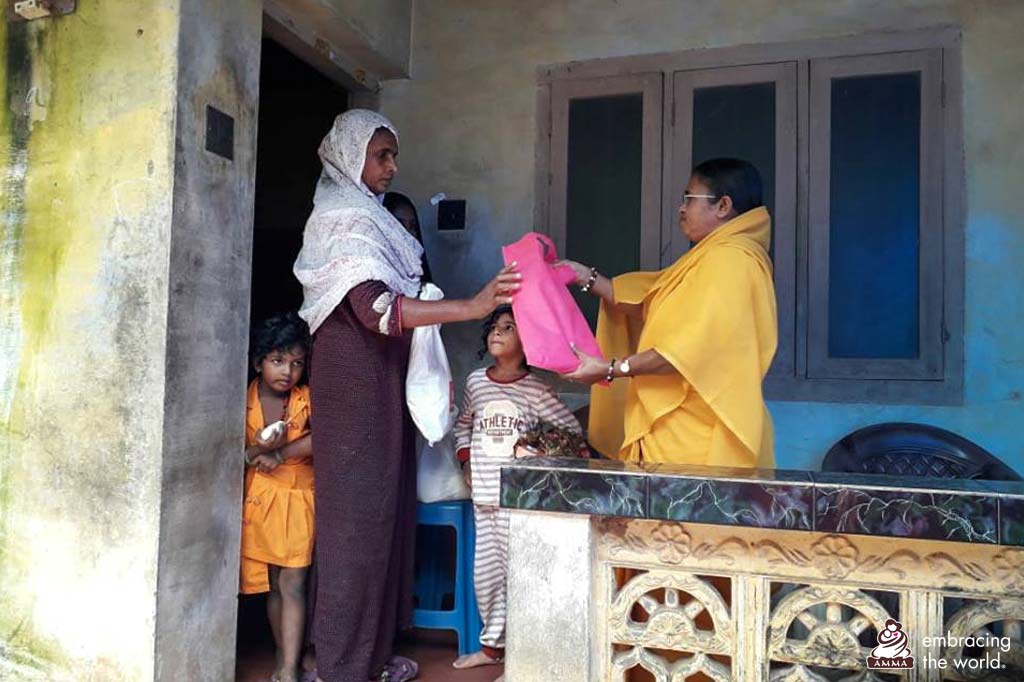
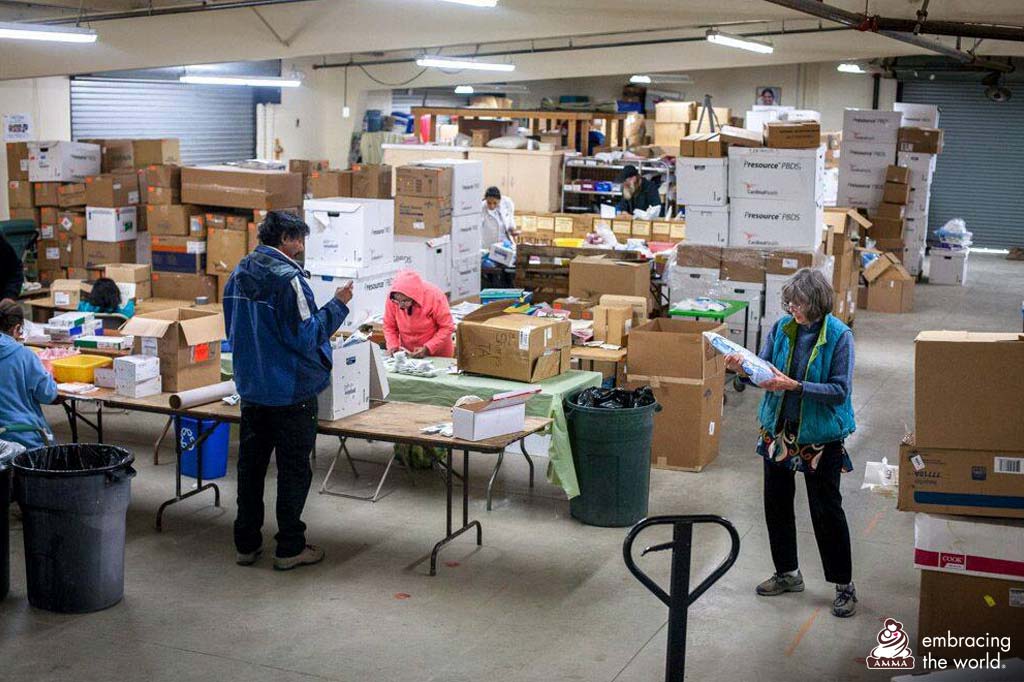
Answering a call–university students started a helpline to save lives in the Kerala floods
August 27, 2018 - Kollam, Kerala, India
During the Kerala floods, students and faculty at Amrita Vishwa Vidyapeetham’s Amritapuri Campus were desperate to think of some way to help the hundreds of thousands of flood victims throughout the state.
They had already set up donation centers for clothing, food and other care supplies. They had also already made plans to start travelling to affected communities to begin cleanup when waters receded. But it didn’t feel like enough.
Then the idea came to them, “What if we could set up a call centre to help rescue the stranded?” And so at the university on August 16th at 1:00 p.m., enough people came together and enough technology was set up to begin Amrita Helpline̶--a 24-hour call-in rescue center.
Within five days, the team had fielded more than 25,000 calls and connected over 100,000 flood victims with the appropriate relief services. This included government officials, Navy, Air Force, National Disaster Response Force, Kerala State Police, local fishermen and other volunteering agencies.
For example, the helpline received a call from a woman who desperately explained that her elderly mother was clinging to her back, while she held a baby in her arms above the rising waters.
The call center volunteers reached out to a nearby fishing boat and within ten minutes, the woman, her mother and child were all saved. Learning of her rescue, the woman’s husband, in gratitude, sent truckloads of relief supplies back to Embracing the World to distribute to those still in need.
The helpline also received a call from a man asking for help as he was stranded in his home. They sent a fishing boat to the area, where the fishermen discovered an elderly couple inside a neighboring house, up to their neck in floodwaters. The couple was astonished to see the fishermen come to save them.
“We couldn’t call,” the couple explained. “We don’t own a mobile phone. As the waters rose, all we could do was pray for someone to rescue us.”
“I can speak for all of the volunteers when I say that we were ecstatic to be able to help in this small way,” said A.R. Amritesh. Amritesh is the coordinator for AYUDH Amritapuri. AYUDH is Embracing the World’s youth chapter and they played a central role in running the helpline.
“We got a lot of positive feedback from the Indian Air Force and Navy, telling us that the information collected through the Amrita Helpline helped them to better target their rescue and relief operations and to follow through with greater speed.”
The helpline team ultimately consisted of more than 400 students and faculty who broke their days up into three different shifts for five days straight. When a call came into the helpline, 20 phones in parallel servicing were continuously answered.
“I can say with confidence that we fielded every single call that came in,” said Amritesh. “Each of the student volunteers would ensure the caller’s information was passed on to the relevant rescue teams. They would then follow through until the stranded persons were secured to safety.”
Not only did the volunteers work the phone lines, they also fielded help requests via the internet and social media. They used special techniques to identify and verify information about locations, routes, relief agencies, volunteers and suppliers. They then conveyed this information to rescue teams to help them precisely target their operations.
This commitment made the services provided by Amrita Helpline invaluable and popular both among the public and rescue teams. The helpline also coordinated the distribution of food, clothes, medicines, and other essentials among the rescues. In addition, the volunteers were able to help give assurances to relatives of flood victims living abroad.
“There are Malayalees all over the world,” said Ramesh Azhakesan, AYUDH Core Committee Member. “The fact that we were able to field calls from the Gulf, Europe and the U.S. and help families learn the whereabouts and safety of their relatives gave thousands of people a lot of relief.”
The Amrita Helpline was a demonstration of how technology and teamwork can help during calamities through the positive use of social media. The motivation for Amrita Helpline came from the Compassionate Kerala group, an initiative by Prashanth Nair, a former collector with the Indian Administrative Service (IAS) in Calicut, Kerala.
Meanwhile, restoration and relief services for people affected by the floods continue to grow. More volunteer teams are assembling to visit locations and aid in medical treatment, essential supplies, environmental cleanup and assessment of how to rebuild damaged buildings and properties.
We are working hard to reach remote tribal communities in Kerala, as these are villages that are mostly isolated at the best of times.
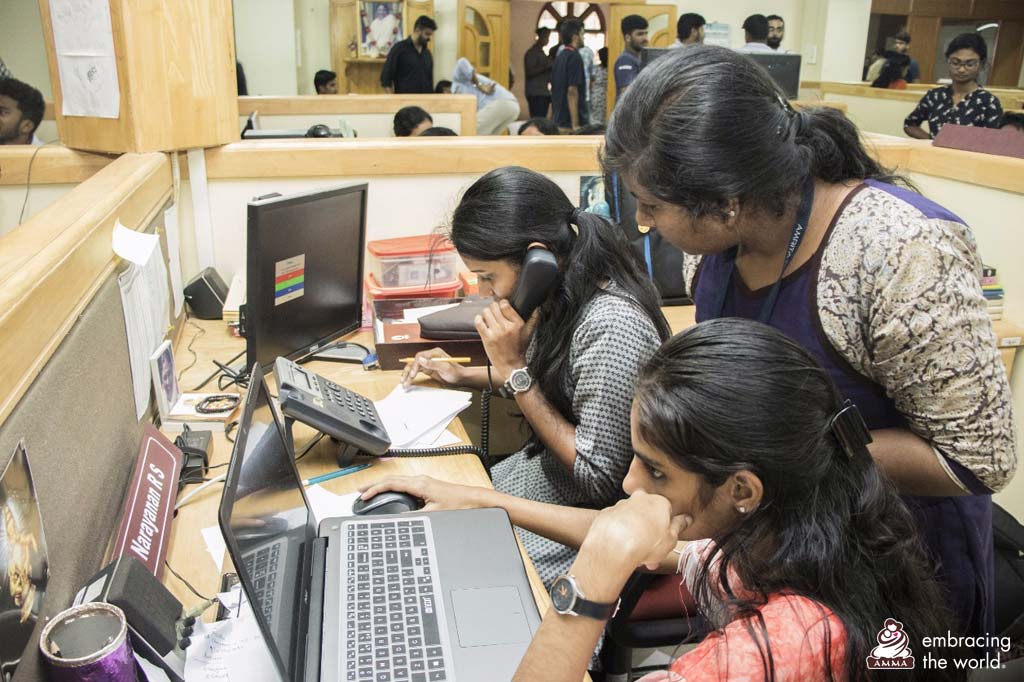
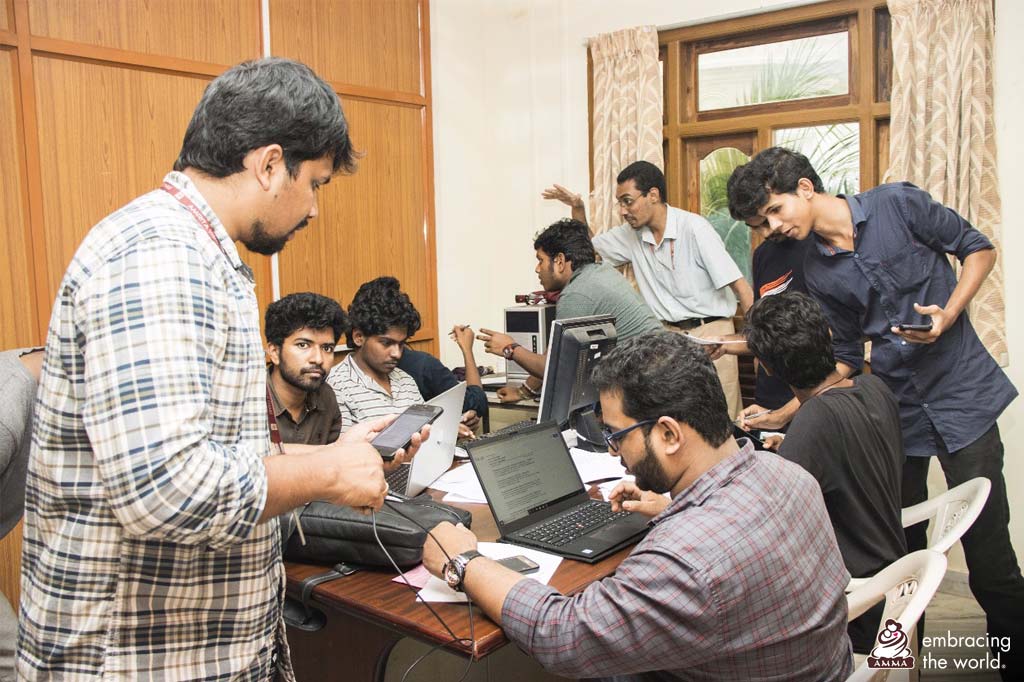
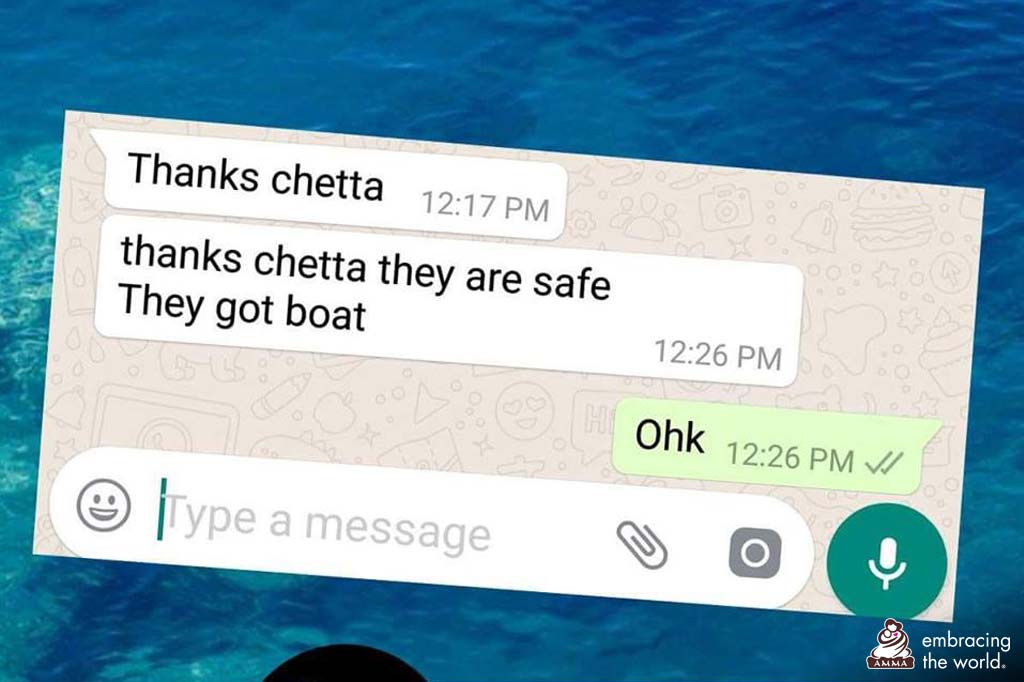
Contestando a una llamada: así se inició la línea de ayuda que ha salvado vidas en las inundaciones de Kerala
27 de agosto de 2018 - Kollam, Kerala, India
"Vi a miles de familias, con los mismos sentimientos de inseguridad que yo, compartir sus pérdidas", explica Sreeni KR. Sreeni que trabaja con Amrita SeRVe, nuestro proyecto de desarrollo de aldeas.
"En el campamento he visto a los ricos y a los pobres, al orfebre y al herrero, al terrateniente y al obrero todos juntos. Compartiendo la misma comida, refugio y ropa. He visto a los hermanos cristianos preparar comida y servirla a familias hindúes y musulmanas. Esta es la belleza de la India".
Sreeni estaba en un tren viajando desde Mumbai cuando las aguas de la inundación golpearon su casa en Poolani, Meloor. Es una pequeña comunidad de 2.500 familias, a unos 75 kilómetros al norte de la ciudad más grande de Kerala, Kochi, y a unos 50 kilómetros tierra adentro desde el Mar Arábigo.
Mientras Sreeni viajaba, descubrió que las aguas de las inundaciones llegaban a 15 metrosde altura y a la gente entraba en pánico y huía a los campamentos de refugiados. Pero no pudo contactarcon a su esposa, hija y otros miembros de la familia durante muchas horas. Su estado de estrés es inimaginable.
Sreeni tuvo que detener sus viajes en la estación de tren más cercana en la ciudad de Coimbatore debido a las carreteras inundadas. Finalmente llamó a su familia por teléfono. Estaban bien pero les costó dos días encontrar refugio en un campamento de socorro, y Sreeni tardó otros dos días en poder unirse a ellos.
Cuando Sreeni llegó al campamento de 4.000 personas desplazadas, estaba agradecido de ver a miembros de diversos partidos políticos, médicos, equipos médicos y policías uniéndose para organizarse muy bien. La mayoría de los evacuados ni siquiera cambiaron de ropa. Pero el campamento pudo proporcionar suficientes alimentos, suministros y ropa.
"Cuando llegué a casa a la mañana siguiente y abrí la puerta, la situación era más horrible de lo que había pensado. Casi todo estaba destruido. La sala estaba llena de limo, barro, ramas de árboles, hojas y muchos tipos de serpientes ", describe Sreeni.
"Tendremos que limpiar muchas más veces antes de volver a entrar. Todos los pozos están repletos de botellas de plástico y desechos. Tenemos escasez de agua potable y alimentos. La pérdida es increíble. Lo que mis padres ganaron y ahorraron durante los últimos sesenta años desapareció en segundos. Pero gracias a Dios no ha habido ninguna víctima humana y nos quedamos con cuatro paredes estructuradas y un techo".
La situación de Sreeni es una de las que miles de personas de Kerala a la que se enfrentarán en los próximos días. A medida que retroceden las aguas de la inundación, es hora de evaluar los daños generales y comenzar la limpieza y la restauración.
Los edificios, la infraestructura y las tierras de cultivo en todo el estado se han quedado en ruinas. En general, han perecido 300 personas, alrededor de 724.000 se han visto desplazadas de sus hogares y se han refugiado en más de 5.600 campamentos de refugiados que funcionan en escuelas, colegios, iglesias y salas de convenciones. El trabajo incluye la tarea de aplicar la limpieza para prevenir enfermedades transmitidas por el agua, como la fiebre tifoidea, el cólera y la hepatitis A.
Los voluntarios de Embracing the World continúan participando en los esfuerzos. Los campamentos de socorro en 30 de nuestras 40 escuelas Amrita Vidyalayam continúan en funcionamiento, y los equipos ya comenzaron a desplazarse a las comunidades para ayudar con la limpieza inicial. Las donaciones de alimentos, agua y suministros esenciales se están clasificando y enviando a los necesitados.
De hecho, una tremenda donación de suministros médicos llegó procedente del Centro M.A. Center San Ramon, California, EE. UU. Los voluntarios se reúnen para clasificar, contar y empacar los artículos para enviarlos a la India.
A pesar del hecho de que las aguas de las inundaciones afectaro a la planta baja del Instituto Amrita de Ciencias Médicas e Investigación (Hospital Amrita), se limpiaron en un día y el tratamiento vital se mantuvo sin interrupción. Las unidades médicas que han estado viajando a áreas aisladas desde el comienzo de las inundaciones también continúan su trabajo.
El centro de llamadas de emergencia AYUDH Amritapuri de 24 horas en la Universidad Amrita Vishwa Vidyapeetham recibió 25,000 llamadas que conectaron con equipos de rescate y ayuda a más de 100,000 personas. Las llamadas fueron recibidas por voluntarios y luego enviadas a guardacostas y a los equipos de rescate del ejército. El centro permanece activo. De hecho, un equipo del Centro Amrita para Redes y Aplicaciones desarrolló una aplicación especializada para administrar las llamadas de emergencia.
"Puedo hablar por todos los voluntarios cuando digo que estamos encantados de poder ayudar de esta pequeña manera", dijo el coordinador de AYUDH, Amritesh. "Recibimos muchos comentarios positivos de la Fuerza Aérea y de la Marina india, pues la información recopilada a través de la Línea de Ayuda de Amrita les ha ayudado a enfocarse mejor en sus operaciones de rescate y socorro y a seguir adelante con mayor celeridad".
A medida que evoluciona la valoración de las inundaciones, los equipos para la reconstrucción general de la comunidad se preparan para el largo camino que les queda por recorrer.



Las personas vuelven a sus casas en Kerala a medida que retroceden las aguas
23 de agosto de 2018 - Kerala, India
"Vi a miles de familias, con los mismos sentimientos de inseguridad que yo, compartir sus pérdidas", explica Sreeni KR. Sreeni que trabaja con Amrita SeRVe, nuestro proyecto de desarrollo de aldeas.
"En el campamento he visto a los ricos y a los pobres, al orfebre y al herrero, al terrateniente y al obrero todos juntos. Compartiendo la misma comida, refugio y ropa. He visto a los hermanos cristianos preparar comida y servirla a familias hindúes y musulmanas. Esta es la belleza de la India".
Sreeni estaba en un tren viajando desde Mumbai cuando las aguas de la inundación golpearon su casa en Poolani, Meloor. Es una pequeña comunidad de 2.500 familias, a unos 75 kilómetros al norte de la ciudad más grande de Kerala, Kochi, y a unos 50 kilómetros tierra adentro desde el Mar Arábigo.
Mientras Sreeni viajaba, descubrió que las aguas de las inundaciones llegaban a 15 metrosde altura y a la gente entraba en pánico y huía a los campamentos de refugiados. Pero no pudo contactarcon a su esposa, hija y otros miembros de la familia durante muchas horas. Su estado de estrés es inimaginable.
Sreeni tuvo que detener sus viajes en la estación de tren más cercana en la ciudad de Coimbatore debido a las carreteras inundadas. Finalmente llamó a su familia por teléfono. Estaban bien pero les costó dos días encontrar refugio en un campamento de socorro, y Sreeni tardó otros dos días en poder unirse a ellos.
Cuando Sreeni llegó al campamento de 4.000 personas desplazadas, estaba agradecido de ver a miembros de diversos partidos políticos, médicos, equipos médicos y policías uniéndose para organizarse muy bien. La mayoría de los evacuados ni siquiera cambiaron de ropa. Pero el campamento pudo proporcionar suficientes alimentos, suministros y ropa.
"Cuando llegué a casa a la mañana siguiente y abrí la puerta, la situación era más horrible de lo que había pensado. Casi todo estaba destruido. La sala estaba llena de limo, barro, ramas de árboles, hojas y muchos tipos de serpientes ", describe Sreeni.
"Tendremos que limpiar muchas más veces antes de volver a entrar. Todos los pozos están repletos de botellas de plástico y desechos. Tenemos escasez de agua potable y alimentos. La pérdida es increíble. Lo que mis padres ganaron y ahorraron durante los últimos sesenta años desapareció en segundos. Pero gracias a Dios no ha habido ninguna víctima humana y nos quedamos con cuatro paredes estructuradas y un techo".
La situación de Sreeni es una de las que miles de personas de Kerala a la que se enfrentarán en los próximos días. A medida que retroceden las aguas de la inundación, es hora de evaluar los daños generales y comenzar la limpieza y la restauración.
Los edificios, la infraestructura y las tierras de cultivo en todo el estado se han quedado en ruinas. En general, han perecido 300 personas, alrededor de 724.000 se han visto desplazadas de sus hogares y se han refugiado en más de 5.600 campamentos de refugiados que funcionan en escuelas, colegios, iglesias y salas de convenciones. El trabajo incluye la tarea de aplicar la limpieza para prevenir enfermedades transmitidas por el agua, como la fiebre tifoidea, el cólera y la hepatitis A.
Los voluntarios de Embracing the World continúan participando en los esfuerzos. Los campamentos de socorro en 30 de nuestras 40 escuelas Amrita Vidyalayam continúan en funcionamiento, y los equipos ya comenzaron a desplazarse a las comunidades para ayudar con la limpieza inicial. Las donaciones de alimentos, agua y suministros esenciales se están clasificando y enviando a los necesitados.
De hecho, una tremenda donación de suministros médicos llegó procedente del Centro M.A. Center San Ramon, California, EE. UU. Los voluntarios se reúnen para clasificar, contar y empacar los artículos para enviarlos a la India.
A pesar del hecho de que las aguas de las inundaciones afectaro a la planta baja del Instituto Amrita de Ciencias Médicas e Investigación (Hospital Amrita), se limpiaron en un día y el tratamiento vital se mantuvo sin interrupción. Las unidades médicas que han estado viajando a áreas aisladas desde el comienzo de las inundaciones también continúan su trabajo.
El centro de llamadas de emergenciaAYUDH Amritapuri de 24 horas en la Universidad Amrita Vishwa Vidyapeetham recibió 25,000 llamadas que conectaron con equipos de rescate y ayuda a más de 100,000 personas. Las llamadas fueron recibidas por voluntarios y luego enviadas a guardacostas y a los equipos de rescate del ejército. El centro permanece activo. De hecho, un equipo delCentro Amrita para Redes y Aplicaciones desarrolló una aplicación especializada para administrar las llamadas de emergencia.
"Puedo hablar por todos los voluntarios cuando digo que estamos encantados de poder ayudar de esta pequeña manera", dijo el coordinador de AYUDH, Amritesh. "Recibimos muchos comentarios positivos de la Fuerza Aérea y de la Marina india, pues la información recopilada a través de la Línea de Ayuda de Amrita les ha ayudado a enfocarse mejor en sus operaciones de rescate y socorro y a seguir adelante con mayor celeridad".
A medida que evoluciona la valoración de las inundaciones, los equipos para la reconstrucción general de la comunidad se preparan para el largo camino que les queda por recorrer.






Gira europea d'Amma 2018
Amma visita Europa novament aquest any.
Ets cordialment convidat / o a assistir a aquests esdeveniments gratuïts i a conèixer a Amma en persona.
Octubre 9 - 11: Granollers (Barcelona), Spain (Amritapuri's new)
Octubre 13 - 14: Dublin, Ireland (Amritapuri's new)
Octubre 16 - 17: Houten, Netherlands (Amritapuri's new)
Octubre 19 - 21: Winterthur, Switzerland (Amritapuri's new)
Octubre 23 - 24: Copenhagen, Denmark (Amritapuri's new)
Octubre 26 - 28: Chalon en Champagne, France (Amritapuri's new)
Octubre 30 - 31: Munich, Germany (Amritapuri's new)
Novembre 2 - 3: M.A.Center, Brombachtal, Germany (Amritapuri's new)
Novembre 5 - 7: Toulon, France (Amritapuri's new)
Novembre 10 - 12: Milano, Italy (Amritapuri's new)
Novembre 14 (tarda) - 16: London, United Kingdom
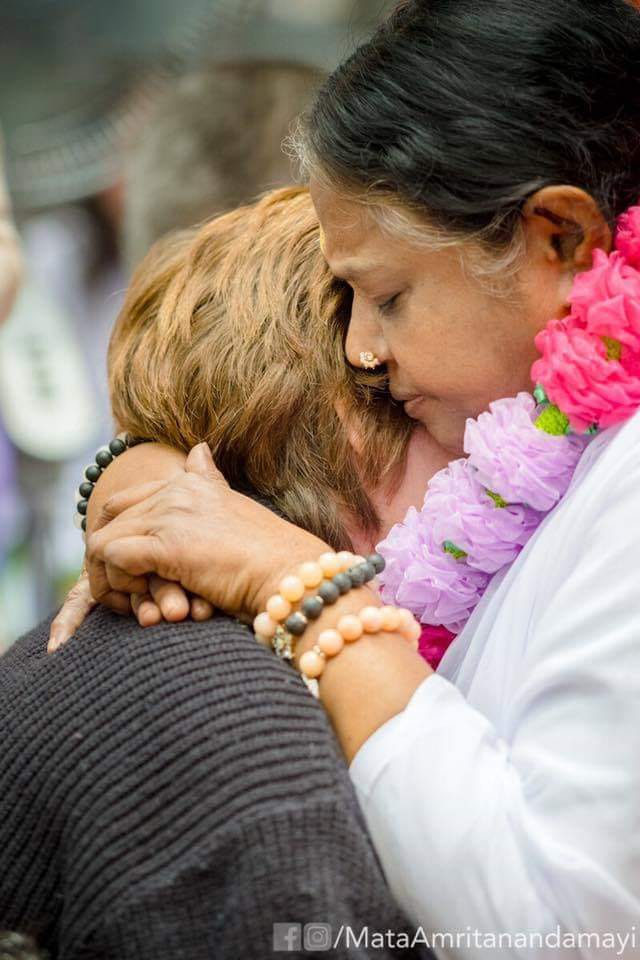
Gira europea de Amma 2018
Amma visita de nuevo Europa este año.
Estás cordialmente invitada/o a asistir a estos eventos gratuitos y a conocer a Amma en persona.
Octubre 9 - 11: Granollers (Barcelona), Spain (Amritapuri's new)
Octubre 13 - 14: Dublin, Ireland (Amritapuri's new)
Octubre 16 - 17: Houten, Netherlands (Amritapuri's new)
Octubre 19 - 21: Winterthur, Switzerland (Amritapuri's new)
Octubre 23 - 24: Copenhagen, Denmark (Amritapuri's new)
Octubre 26 - 28: Chalon en Champagne, France (Amritapuri's new)
Octubre 30 - 31: Munich, Germany (Amritapuri's new)
Noviembre 2 - 3: M.A.Center, Brombachtal, Germany (Amritapuri's new)
Noviembre 5 - 7: Toulon, France (Amritapuri's new)
Noviembre 10 - 12: Milano, Italy (Amritapuri's new)
Noviembre 14 (tarde) - 16: London, United Kingdom

Revista Matruvani (Septiembre 2018)
4 MENSAJE DE AMMA
El verdadero buscador
9 SÁTSANG
Amor por la música divina
Swami Amritatmananda Puri, India
EXPERIENCIA
19 No hay mal que por bien no venga
Richard Schiffman, Estados Unidos
24 Más cerca del centro
Edith Moana Schreier, Suiza
33 En busca de un mundo mejor
Mathilde Vermer, Francia
37 PALABRAS DE SABIDURÍA
SANÁTANA DHARMA
38 Reflexiones sobre el Libro de Dios - 8 -
Swami Paramatmananda Puri, Estados Unidos
47 La charla de Amma sobre el Gurú
Br. Shantamrita Chaitanya, Estados Unidos
52 OBRA HUMANITARIA
La ciencia y los estudiantes luchan contra la pobreza
Mathilde Vermer, Francia
57 ALREDEDOR DE AMMA
¡Amma se está ocupando de eso!
60 INFORMACIONES
64 CONTACTOS



